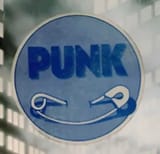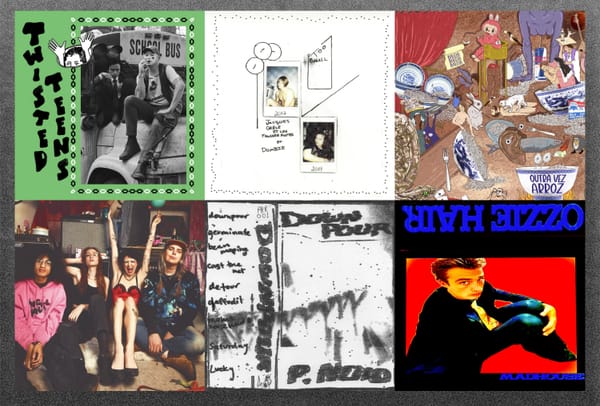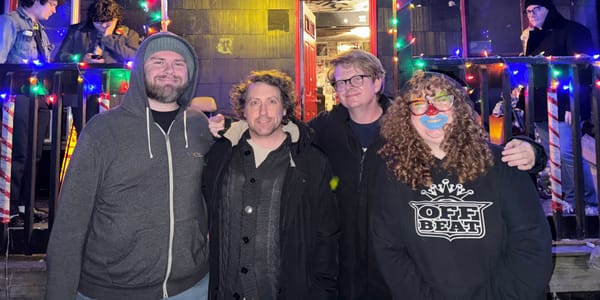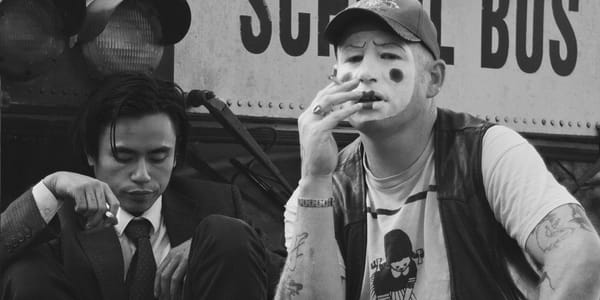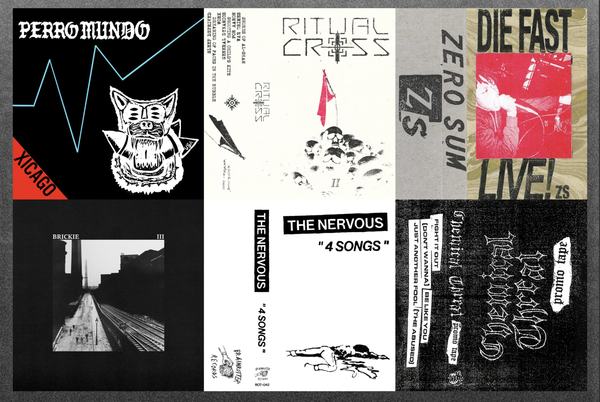on deadline with optic sink
How the Memphis band—one of the best in the country—made their best album yet with a little help from their friends.
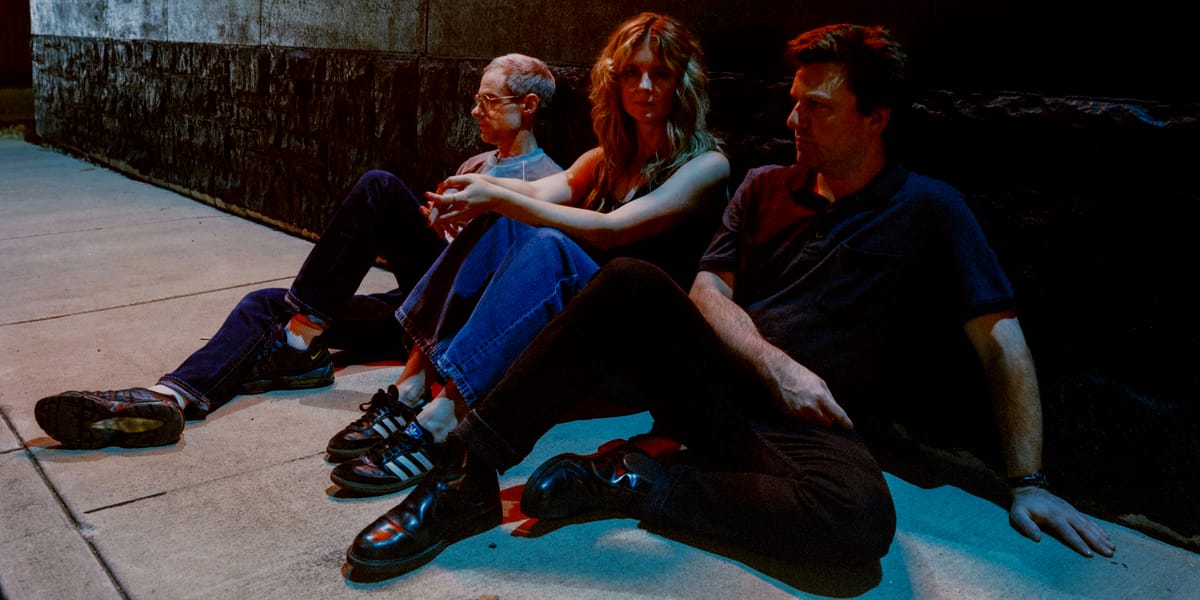
It’s not name dropping when you’re in Memphis, huddled under the canopy of a poplar tree, in earshot of so-and-so’s set at the Overton Park Shell, to stop and mention it’s where Elvis Presley played his first concert on July 30, 1954. It’s just a fact. Similarly it’s not boasting when I say I’m in a catcher’s stance, on assignment to interview Optic Sink (among the best bands in the country right now) whose members—Natalie Hoffmann, Ben Bausermeister and Keith Cooper—have kept this storied city poppin’ off and on the musical map with their bands Nots, Magic Kids, and the Sheiks. More facts.
Lira Mondal and Caufield Schnug—of Sweeping Promises notoriety—invited Optic Sink to record 2023’s Glass Blocks to their home studio in Lawrence, Kansas. The band returned to the couple’s studio for their latest album, Lucky Number, released by Feel It Records on Halloween. Again, these are just facts. But hearing from the band about how a stalwart songsmith of Greg Cartwright’s caliber contributed to their songwriting process after taking an interest in the band is closer to a flex, and should rightfully impress. The proof of which is on this record, and will bring you to your feet.
In recent years Cartwright returned to Memphis, where he first cut his teeth with the Painkillers (later rechristened the Compulsive Gamblers), Reigning Sound, and the Oblivians. Now he’s settled in more permanently, becoming bi-coastal (as he puts it) with his previous homebase in Ashville, North Carolina. Cartwright reconnected with local artists who were just coming up when he last moved away, including Hoffman. Cartwright signed on to produce the band’s album (and his production credits are indeed legendary), but family health matters kept him from joining their recording sessions in Lawrence. He was present for some fruitful rehearsals instead.
“They were wide open and eager to hear what I thought about the songs and where I thought they might be able to go,” Cartwright told me over the phone. “That was just a joy. I think it’s their best record yet. It just felt like the best representation of everything they had played me in rehearsals and additions just made the songs even better. I was super proud of them.”
Their producer Caufield Schnug echoed Cartwright’s feeling on the subject. “Working with Optic Sink is always a pleasure and we have built up a rhythm and shared humour. I like that they have a spontaneous and aleatoric punk band mentality, so they color outside the lines of their electronic grid. And they appeal to my film school roots insofar as Natalie is such a cinematic thinker, making lyrical and structural ‘scenes’ with her music, and as the recordist I'm trying to find how the light passes through. I'm proud of this one.”
I didn’t do a damn thing but can’t help feeling a piece of Cartwright and Schnug’s pride in the band when I listen to Lucky Number. It’s the trio’s strongest and most exhilarating effort to date. Hearing these eight tightly wound, highly approachable, and immediately memorable tracks, it’s easy to submit to their electronic post-punk dominion as a whole. But how did the band get there? How did listeners get so lucky?
While so many crawl toward creative meaning in the shadow of greater collapse, Optic Sink have managed to capture that unease while dragging it out onto the dancefloor with conviction and gusto. Earlier this fall, the band shared some more with me about their journey toward this current peak they’ve reached on their latest release. Our interview stretched from sometime in the golden hour and into the cover of night, plopped down on the hard park grounds where the king of rock’n’roll once took the stage.
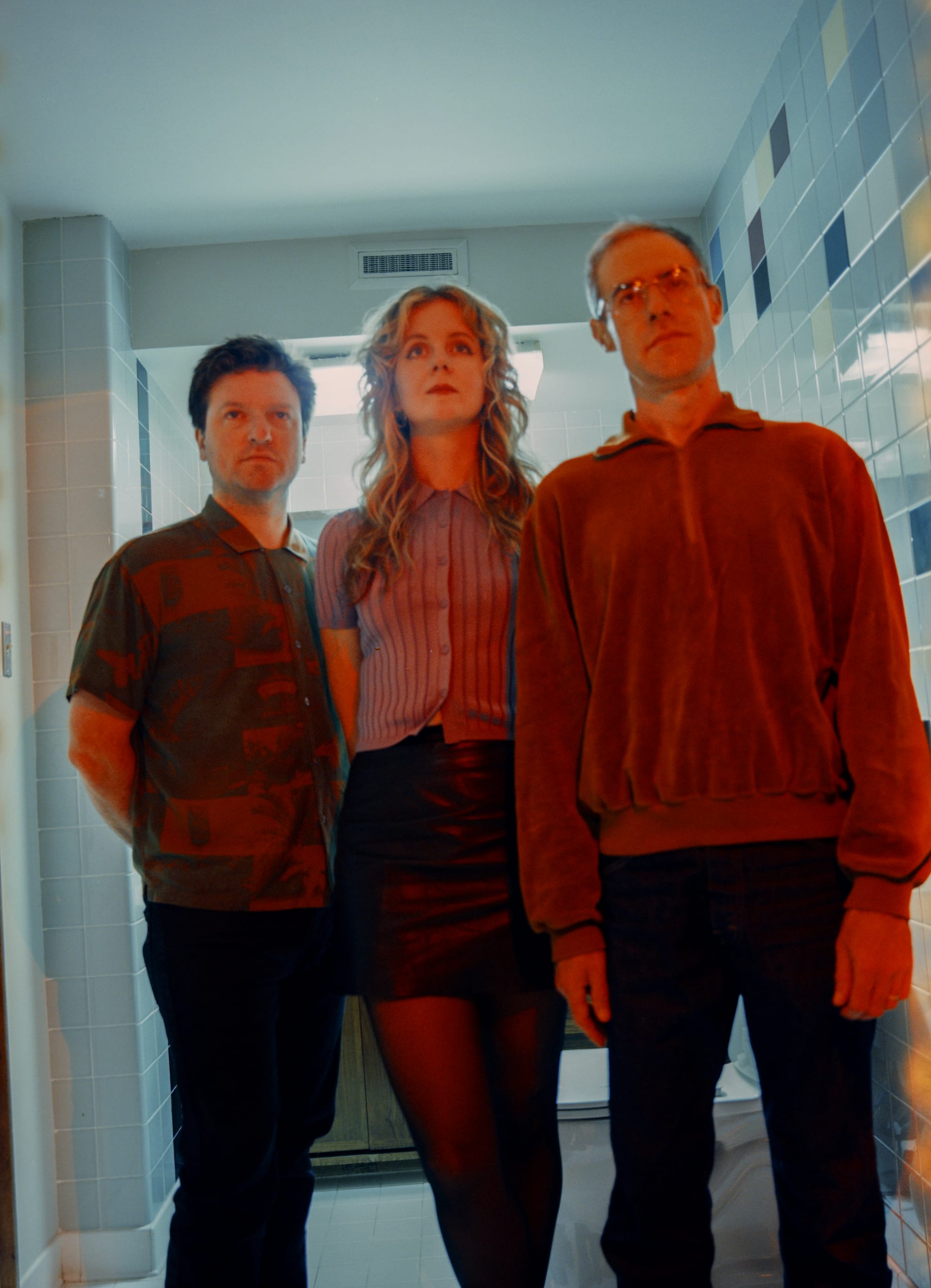
How did Optic Sink form?
Natalie Hoffmann: Me and Ben started playing together in 2020, or 2019 maybe? I was learning how to play synths for Nots and I ended up writing a bunch of stuff and I was like, Oh this is a different project. So I reached out to Ben because he is an incredible electronic musician and drummer. So he started playing drum machines…or machine, at the time.
Ben Bausermeister: The Volca Beats.
Natalie: Yeah, the Volca Beats, because that’s all I had.
What is it?
Ben: It’s this little inexpensive Korg drum machine. It's sort of modeled after the 808. It's an all-analog drum machine, but all the sounds are a little dinky.
Natalie: It has kind of a toy vibe.
Ben: Yeah it's trying to be an 808 so hard. It sounded cool though. I have a multi-effect box that I run it through. Fifty percent of the sound was the effects, and then the performance was tweaking 'em and all that.
So it was what you had, not necessarily the exact sound you were after?
Ben: Yeah, it was just what I had laying around, and then Natalie got the DrumBrute Impact and that was fun—that had pads on it. I could play those pads. And then I upgraded the Vulca Beats to a proper Barringer RD 08 or whatever they call it—808 clone. That sounds really good, and we just copied all the patterns over.
Natalie: And then among all those machine upgrades, we wrote a song where I was playing guitar and I wrote the most basic bass line ever. We went over to record at the Bunker with our friend Keith, and we ended up asking him to join us because he had jumped on bass and it sounded so cool.
Keith Cooper: The Bunker is me and Andrew McCalla's Analog Recording Studio. And it's a practice space for us and a couple other bands, but we also record there. There's no computer screens. It's all tape. It's behind a bar that was called Poplar Lounge. Jim Dandy would hang out there—just a watering hole. And the studio had been around for a while and then it became run down. McCalla found it, refurbished it. Now it's a fully functioning recording studio-slash-rehearsal space. It was pretty late and we'd been cooking for a while and it was just like, Shit, I'll play.
Natalie: So we asked Keith to join Optic Sink and his first show was a Maya Deren live score.
Keith: It was totally avant garde. They got asked to do these scores for these experimental films. And I don't know if I was officially in the band or this was like the beginning of the process or something.
Your audition?
Keith: Yeah. But it was totally freeform. We were like composing original ideas together in improv. We did that and then we played at a warehouse with this experimental sculptor, Scott Carter. He built these plants with contact mics. And every month he was having bands do improv jams and we got asked—or they got asked—and I was involved. It's like, Alright, here's gig number two. Another freeform experimental noise thing. Then I had to start learning the Optic Sink songs—
Natalie: Which is a journey.
Keith: Yeah, I was playing bass and Natalie's got the low-end synth. There’s a lot going on. I was trying to find a nice middle-register to fit in: growing together musically and rearranging everything sonically, adding this new instrument and new person into the mix.
Natalie: The single on Spacecase Records came out where Keith played bass on both sides, and then he joined officially. We played a show with Sweeping Promises and this whole plan hatched to go record with them. And that's when we started writing songs for our second album, Glass Blocks.
Do you think meeting Sweeping Promises and having an opportunity to record with them accelerated the pace of the band?
Keith: It was big.
Natalie: We set a deadline. I went to breakfast with Sweeping Promises and they were like, “We don't wanna be too pushy or anything, but we’d love to record y’all.” And I was like, “Too pushy? Please! It would be an honor. It’d be so much fun.” And we had all started hitting it off and becoming friends. And then I was looking at my calendar ‘cause I was working on a TV show at the time, and I was like, “OK, I can do it these weeks at the end of January.”
Keith: We played with them in, like August or July?
Natalie: It was a quick turnaround. We had this deadline and we all started practicing together every week and wrote these songs for Glass Blocks. We also finished three of them in the studio. “Modelesque” was pretty much figured out in the studio.
Ben: It’s important to have time to do that. Not over prep or whatever.
Keith: We left Memphis and went to their home studio in Lawrence. It was snowing and it was three in the morning and the portal opened and we just locked in and this fully fledged song came out.
Natalie: We stayed at their house, recorded there, we did this real deep dive into recording for 10 days.
Keith: We didn’t know anybody there, and it was just extremely cold. And that was the idea—we want to go there so we don’t have anybody hollering and distracting us from what we need to do.
Did you know that you wanted to tour on the record?
Natalie: Hell yeah. I could tour all the time. I love touring.
Ben: I do love it. Yeah.
Keith: I love touring. I love driving. I love rocking. Yeah. I mean all three of us, we’ve been in a ton of bands and we’ve been in bands with more members and now we’re just a three piece. We got a really nice chemistry. We know the game, so it’s this really nice formula. Other than your classic ups and downs, rough gigs, we have a good time. I love touring.
Ben: I love touring too, it’s just that I have a kid so I can’t always be gone, but being on the road is the number one favorite thing to do. For sure.
I think it’s okay to not like touring but it is awesome, maybe rare even, that everybody’s on the same page.
Ben: I would not like it if I was in a band with people that I didn't like. And luckily for me, Keith and Natalie are the best people ever.
Natalie: Aw.
Ben: Like, I like you. I like both of you.
Keith: Thank you.
Ben: Fun people to tour with, that makes the difference.
How has booking been—finding shows you want to play with a new project?
Natalie: I started doing this radio show called Strange Wave on WYXR here in Memphis, and I could easily play only stuff from like the late ’70s or early ’80s, but eventually I was like, I need a good excuse to research new bands, like, constantly. I like doing that and I like knowing what's going on, so I started trying to make sure there was a good chunk of new bands on the radio show. And that honestly has helped me to know who to hit up in different cities, who I already like and would love to play with. We book bands’ shows here in Memphis, so we kind of know the way that it's probably gonna go in another city, too.
Between enjoying your time on the road, doing radio, and booking shows, when did you get around to writing and recording your new album, Lucky Number?
Natalie: We did the deadline thing again. I love the deadline. We set another date with Sleeping Promises and we all were like, All right, that’s when we go record. So we have to have eight songs done. Man, and some of those songs we've been writing for a really long time. “Construction” I feel like has been with us forever. But it’s evolved a bunch. I would bring in an idea, me and Keith would work up some melodies. We would all work together in the studio in our practice space, and we started fleshing it out. We also called in some big guns at the end.
Keith: Around the same time, Greg Cartwright moved back to Memphis and got reintegrated into the musical community here. Natalie developed a friendship with Greg through WYXR radio, and he pretty much offered his services as a producer.
Natalie: He didn't end up being a total producer on it because he had some family stuff. The original plan was for him to come to Lawrence with us. The idea of Greg meeting Caufield and Lira warms my heart. That would just be so wonderful.
Keith: More bridge building.
Natalie: They're all such wonderful people, open to collaboration, and writing amazing songs. So I just feel stoked to be hanging out with all of ’em. But yeah, Greg couldn't come with us, but he did come to a couple of our practices. The song “Lucky Number” specifically—all the parts were there, but Greg was super helpful with subtle edits that, in my opinion, helped the song completely click.
Keith: Yeah he waved a magic wand and added an outside opinion.
Ben: Some structure stuff.
Keith: The guy’s a master craftsman.
Natalie: “Lucky Number” was interesting because we could have released exactly what we’d written, but Greg's touch was so brilliant. He was like, “What if the guitar just drops out there?” That kind of thing, when you get too close to it, you’re like, I’m always playing guitar. It never drops out. You’re just on and don’t think of that.
Keith: “On this lick, why don't you end it on the octave instead of the same lick four times?” Stuff like that you forget about when you’re so close to your own tune.
Natalie: He hung out with us for a practice while we were working on “Construction” and he had some really good, really smart edits to something that all of us had gotten so close to that we couldn't even think about it straight anymore. We’re like, Is this even a song? Should we just get rid of the whole thing?
Keith: He would come in and he would just sit and we would play. He was just like vapor. We wouldn't notice he was in the room. We were just doing our thing. He sat at the drum kit and he had a guitar so he was learning the stuff so he’d know what we're working with and manipulate it and mess with it.
Natalie: His approach was so cool 'cause he did not come in being like, Alright, I’m gonna fix these songs. He’s Greg Cartwright. He’s one of the best songwriters ever.
Keith: It wasn’t heavy handed.
Natalie: It wasn’t, but it was so perfect. It was like he got us to do stuff that was smart and made the song just click together and hit so much better. It was truly amazing.
Keith: Now it’s just like formulas that you can apply forever, you know? It’s songwriting practice techniques.
Ben: He also wrote a whole beat on “Lucky Number” that has a different kick pattern and one big snare. He zhuzhed that one up for sure.
In addition to deadlines it seems like you’ve been receptive to positive reinforcement making these albums.
Keith: First round, Lira and Caulfield were the positive reinforcement, and then this next round we know we got them and we got a great spot, and then Greg came along. All these people came into the fold and supported our ideas.
Natalie: We got lucky in a lot of ways, but also it’s just cool to be in Memphis with these legends like Greg. He is open to—and wants to—collaborate with different musicians and see what they’re up to. Same with Caufield and Lira. Their antennas are up.
Does that support lead to pushing yourselves more?
Natalie: Hell yeah. My lyrics. I remember sitting down and being like, I’m not gonna show Greg some slop. I wanna be stoked about my lyrics. Not that I'm half-assing stuff usually, but it’s another level when you’re showing someone else, especially someone who you’re like, Wow, I really respect this person’s songwriting. I’m not trying to slack off anywhere.
Keith: It made us feel like, Well, we gotta be our best selves and bring it all to the table.
Natalie: It helped gel. Some of the hardest parts about being in a band are getting your schedules together. This record had a cool vibe because the three of us would all meet up and then sometimes I would work on stuff at home. Sometimes me and Keith would meet up to iron out melodic parts, that way we could show Ben so he could write the percussion and beats. Then Greg was coming in for a couple of practices, so it expanded everything. We had to meet this deadline, so we were like, However we can meet up and do this thing, let's do it.
Keith: We had to log in hours, no matter. It was dedicated.
Natalie: And that’s what changed the songs. That’s what develops them melodically.
Did it feel like pressure or was it good pressure?
Keith: Good pressure. Motivating, you know?
Natalie: Definitely some pressure, but—
Keith: But not like freak out or anything, it just gave us drive. But it was the deadline formula that you can't escape from. Everybody else has the date set. There‘s other people waiting for you. If we canceled, you’re screwing somebody else over on their job.
Natalie: I need a deadline. I just won’t do anything if I don’t have a deadline. I’ll just go into oblivion and be like, I’ll play guitar tomorrow. Or I’ll play guitar but it’ll be loose and unfocused and I’ll write a million beginnings to songs and then forget about them. So having a deadline is a good excuse for me personally, to be organized and go back and actually try to craft some songs.
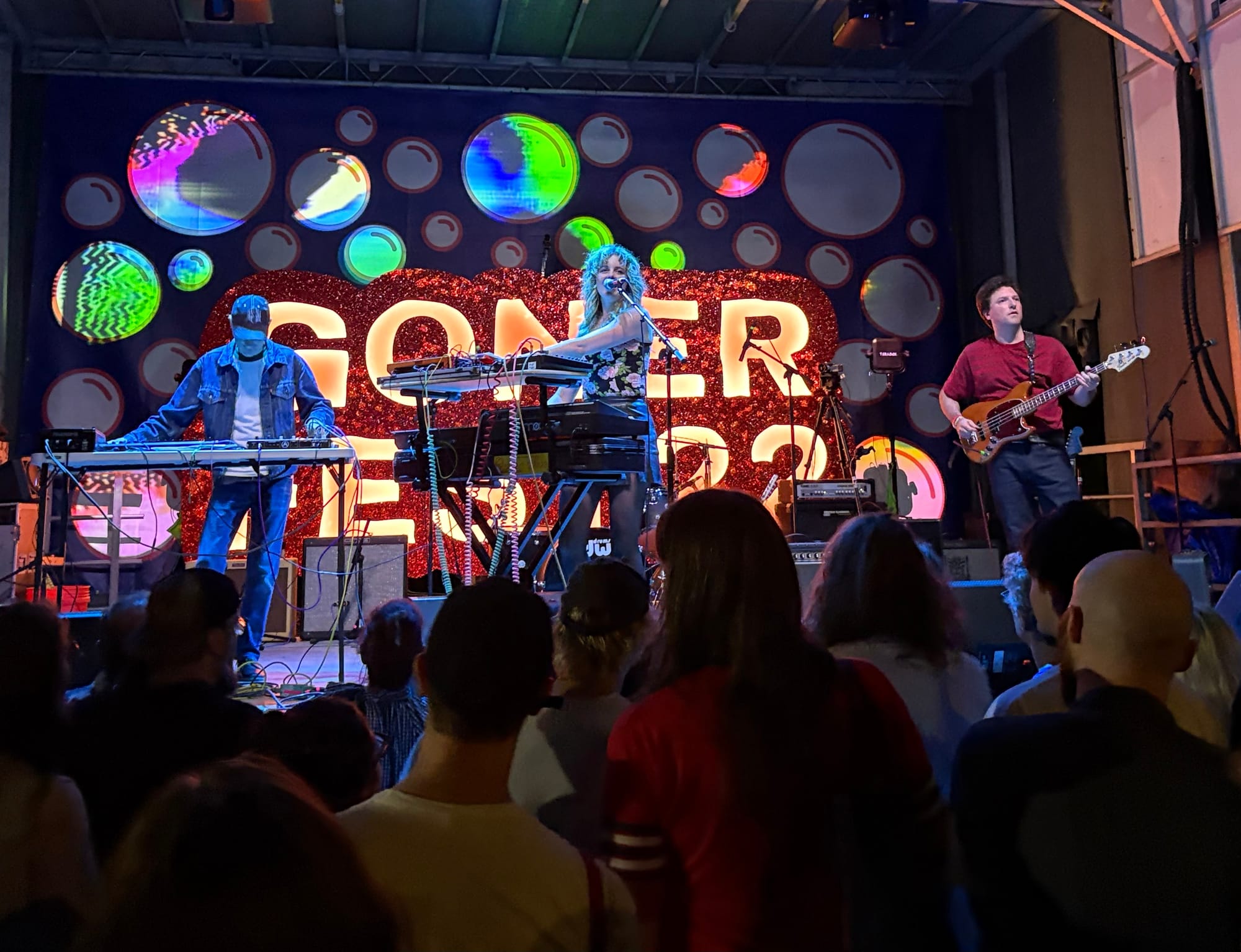
Musicians can be kind of territorial or competitive. It’s cool and seems almost rare how they approached you because they liked your band.
Keith: I think forming alliances is much more valuable.
Natalie: Caufield and Lira really liked our first record—a huge honor. I hear what you’re saying but didn’t feel that at all from them. They just wanted to support something they were stoked about.
Ben: Those types of folks are certainly out there.
Natalie: Oh yeah.
Back to the first time you all performed together live, huh? It all comes full circle. I’ve never seen those films and don’t know anything about her.
Natalie: Maya Deren is this experimental avant garde filmmaker from the ’40s, like, doing her thing. She was a dancer, filmmaker, choreographer and all of that is very evident in her extremely poetic, really cool films. She influenced David Lynch and Stan Brahkage but not a lot of people know about her. We got asked to do a live score to her films by Downtown Arts here in Memphis. We wrote a whole score for five short films, and it was completely different from our music. It was our same instrumentation, but we didn't just go play songs from our first record over her films.
Was it improvised?
Keith: We were at the Bunker and we just watched and played along with it and then we'd find themes and hooks and stuff and build it along that.
Natalie: Yeah, it was really collaborative. Very textural.
Ben: It’s timeless. When you watch it, it’s just like super sick art, it doesn’t matter when it happens, it has the same feeling.
Where can I see it?
Natalie: Maya Deren’s films are available. There’s DVDs and stuff on YouTube and all that. As far as our score, Machine Duplications Recordings and Zach Mitchell released a VHS a couple of days ago.
Any talk of doing it as a record?
Natalie: That would be amazing.
Keith: We talked about it since we redid it for University of Mississippi and relearned the songs and the movements and stuff. And then that’s where it dawned on us: If we go on tour, we got this whole two-pronged thing of doing this at theaters.
Sounds like a deadline.
Natalie: It’s a goal. And it’s a goal to tour on it more. So we’re thinking about our East Coast tour this spring, doing the live score one night and then the next night we do a club show. I would love to spend two days in cities. I’ve never been able to do that on tour. I feel like I’ve toured so much and glazed through all these cities. It would be so nice.
Keith: Yeah and tapping into the arts community from a completely different angle.
Natalie: It’s been really cool, seeing the overlap and meeting new people through doing that.
Keith: We knocked our big daddy deadlines out of the way, now we gotta book a tour. That’s the next deadline.
see/saw is a reader-supported punk publication with no advertisements or investors. If you enjoyed this article, please share and subscribe!

